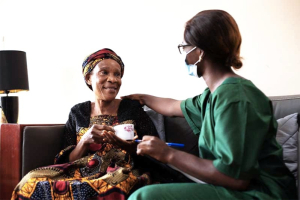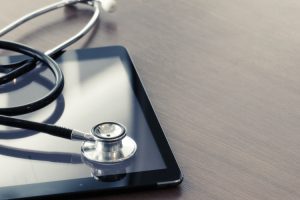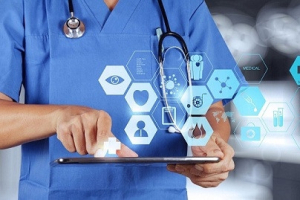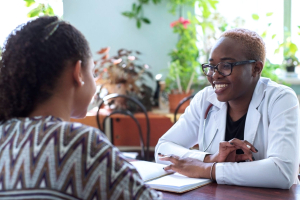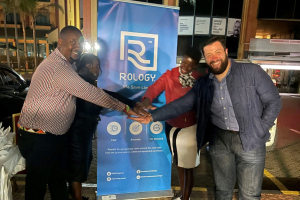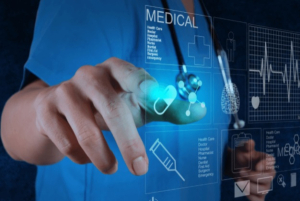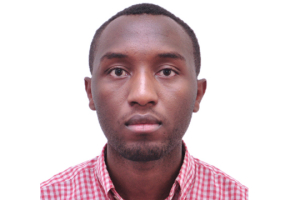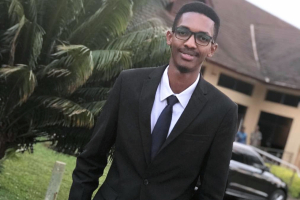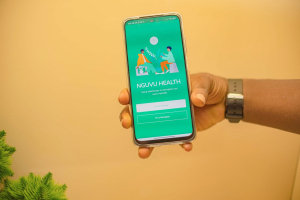Cameroon: Mbombo Home Care offers home healthcare services to the elderly
The solution is the result of one of its co-founders’ experiences. Indeed, when her grandmother got serious burns and was to be hospitalized, there was no one to assist her at the hospital since her parents also had chronic diseases. That is how she decided to create a solution to avoid such pain for others.
Mbombo Home Care is an e-health solution developed by a Cameroonian start-up, founded in 2019. It allows elderly and dependent persons to get home healthcare services.
"Mbombo Home Care assists elderly and dependent people in Cameroon every day. We have a personalized approach to home care and choose the best options to meet your expectations," it says on its web platform.
Currently, it has no mobile app. So, users need to visit its web platform to book its services. Once they click on the “Book an appointment” option on the web platform, users are redirected to a Whatsapp account where they can discuss their needs.
Among other things, Mbombo Home Care offers geriatric and general consultations, nursing and life support services, physical therapy, and even daycare services. The healthtech also rents or sells wheelchairs, anti-scarring mattresses, canes, walkers, and crutches.
In 2021, it had a team of about twenty people, of which 90% were women. They included doctors, nurses, and other healthcare workers in the cities of Douala and Yaoundé. Despite the negative impacts of the coronavirus pandemic on its activities, it has continued to grow.
Adoni Conrad Quenum
Togo: Yvon Koudam supports daily health management duties
He founded KondjiGbale to help doctors fulfill their lifesaving tasks. The startup has been celebrated in Togo and beyond and won him several awards.
Yvon Koudam (pictured) is a Togolese entrepreneur and co-founder/CEO of KondjiGbale, a start-up that aims to facilitate access to healthcare.
His startup, founded in 2019, develops medical technology solutions to simplify the daily management and monitoring of people's health. Through its platform, doctors can access patients’ medical records. Patients can also access teleconsultation services every day from 6 am (Togo time) to midnight and order medication by sending their prescriptions. It also lists on-call pharmacies and gives users the possibility to set medication schedules.
KondjiGbale is accessible, in local languages, via many channels including a mobile and web app, a USSD code, a call center, and SMS. It is partnered with three health centers and over 34 health professionals. To date, it has some 5,165 patients and over 500 consultations booked.
In March 2023, Yvon Koudam represented his country at the Brazzaville International Youth Leadership Forum (BILYF). He shared his knowledge and experience on the panel: "Sustainable Development and Digital Economy".
Between 2016 and 2022, the entrepreneur worked as a programmer analyst in the start-up Clin Sarl U in Togo. In that position, he supported the design, programming, and development of applications for clients and companies such as TMoney and AgriStore. In December 2021, he was a guest speaker at the Emerging Valley Summit. Since December 2022, he is the Delegate of the Youth Innovation Week in Togo.
Through his startup, he has won several competitions, including the Pitch Your Startup Idea organized by Enginnova, the French Embassy in Togo, and the Togo Innovation Challenge of the Ministry of Grassroots Development in 2019. A finalist in the Hacking Covid-19 Africa competition initiated by HEC Paris in 2020, he was also among the 10 finalists of the fifth edition of the RFI App Challenge.
Melchior Koba
Estshara provides telehealth services in Egypt
Healthtech solutions proved useful during the coronavirus pandemic by addressing healthcare accessibility concerns, which has led to increased popularity and encouraged more entrepreneurs to enter the sector.
Estshara is a digital solution developed by an Egyptian startup. Through its web platform and mobile application, it allows users access to health services.
Users need to create an account on the web platform or the Android/iOS apps to access the services offered by the solution. Depending on their symptoms, they can consult with a general practitioner or a specialist. To aid the diagnostic process, users can attach the results of their various tests. They can also communicate with the doctors via text or audio messages.
Estshara offers various packages to users. Its first package is for single consultations, which costs EGP50 (about $1.62). It also has monthly (EGP100) and yearly (EGP1,000) packages. The startup also offers alternative employee health insurance policies to small businesses and startups.
In 2021, it was claiming more than 200,000 consultations. The Android version of its mobile application has been downloaded more than 10,000 times. It dreams of becoming a reference in Egypt and the MENA region. For that purpose, in 2021, it raised about $500,000 in seed funding.
At the time, founder Amin El-Hemaily said: “The investment will help us scale our organization with exceptional talent and enhanced resources, as well as further increase our marketing and sales outreach to support our focused go-to-market strategy and achieve our expansion goals.”
Adoni Conrad Quenum
Djibouti: Moubarik Mahamoud wants to make healthcare accessible and affordable with Medyc
The solution was launched in Guinea under the brand name Evatis. However, its founder chose to continue the project to ease access to healthcare in his country, Djibouti.
Medyc is an e-health solution developed by a Djiboutian start-up. Thanks to integrated videoconferencing tools like Zoom and Google Meet, it allows access to healthcare for its users. It also offers specific services to companies and institutions.
The solution has no mobile applications yet, so users can access its services only by visiting its web platform. New patients have to register first before accessing those services. To book a service, individual users only have to log in -if they already have an account- and click on the “book an appointment” button in the upper right corner, select the service, the date, and the time. The services they can access range from teleconsultation to home care and medicine delivery.
Companies and institutions can access consulting services that support the development of personalized wellness programs for their employees. The healthtech solution also helps them digitize existing physical health records and even trains their teams on how to access those digital records. Medyc also enables hotel guests to receive medical consultations, care, and drugs during their stay.
According to the founder, Moubarik Mahamoud, about 30 patients are currently using Medyc's services. He says the Healthech solution, founded in 2019, is still in its pre-launch phase and collecting feedback to improve its services. It is also carrying out actions to allow easy access to its services for people without access to the internet. “Internet penetration has improved significantly thanks to pricing efforts. We are discussing with our telecom operator to make the platform data-free with our incubation center, CLE, which is leading the negotiations,” Moubarik Mahamoud told We Are Tech Africa.
Since its inception, the solution has completed a €107,000 funding round to support its growth. Apart from Djibouti, it is currently targeting the Ethiopian and Somalian markets since they are closer to its prime market and the demand for quality health services is growing in the regions. Another factor that motivated his choice for Ethiopia and Somalia to be the next stage in Medyc’s growth is the constant improvement of telecom infrastructures in those markets.
Adoni Conrad Quenum
South Africa: NOOSi connects qualified nurses with individuals
The healthtech startup behind the solution was launched after a discussion, between its co-founders, on the lack of affordable healthcare in their country (South Africa). After that discussion, they decided to mobilize qualified healthcare professionals to find a solution to that challenge.
NOOSi is a healthtech solution developed by a South African start-up. It connects -virtually or in person- nurses to people who need home health care. The Cape Town-based healthtech was founded in 2021 by Sumarie Roodt and Catherine Williams to create a community where healthcare is accessible to all.
“NOOSi was started because we wanted to revitalize the South African healthcare system. We believe that this can be done by using a “tech4good” approach in a way that gives hardworking nurses new and better job opportunities and gives patients a way to get affordable and accessible healthcare,” explained Sumarie Roodt.
To access its services, users need to set up their NOOSI accounts through the solution’s web platform. The startup has a skilled workforce to perform every task, from chronic disease management care to mental and psychiatric care. The platform embeds a search bar where one has to fill in information such as the address of the potential patient, the services he/she needs, and the category of the service.
NOOSi always suggests the best nurse for every task since each of them is specialized in a particular area. When users select the nurse they want, they can contact them directly on Whatsapp to book their services. The rates applied depend on the services requested. Currently, the healthtech solution is only available in the Western Cape. The startup is typing to expand to other provinces before a possible international expansion.
Adoni Conrad Quenum
Egypt: Rology connects patients and radiologists via an AI platform
The healthtech solution was developed by a group of entrepreneurs who aim to help people access competitive radiology services.
Rology is an AI platform developed by an eponymous Egyptian start-up. It enables patients to easily book appointments with radiologists. The Cairo-based startup behind the platform was founded in 2017 by Amr Abodraiaa, Moaaz Hossam, Mahmoud Eldefrawy, and Bassam Khallaf to address the shortage of radiologists in Africa.
Via its web platform, users can book an appointment with radiology specialists. They can go live within a few minutes after completing the usual formalities. The startup also offers a free trial. In both cases, users need to fill out a form by providing information such as name, hospital, or type of analysis. After the appointment, the patient receives a report from the specialist within twelve hours, and, in case of an emergency, the report is available within 90 minutes.
Rology works with about 100 hospitals and has completed several rounds of financing ($1 million in total) to expand into Africa and the Middle East. It is now present in eight countries.
In 2020, when the startup raised $860,000, co-founder Amr Abodraiaa said: "for the last three years we saw firsthand how Rology’s services help hospitals offer fast and accurate care to their patients and how it can save patients’ lives. We look forward to expanding Rology’s platform to the African and Middle Eastern market where there is a huge need for Rology’s services and ultimately help hospitals offer better care to their patients."
Adoni Conrad Quenum
Egypt: CheckMe Health provides on-demand blood collection services
In Africa, access to healthcare is challenging in some areas. This is why so many healththech startups are being created to offer interesting solutions to ease access to that basic service.
CheckMe Health is a digital solution developed by an Egyptian startup. It allows users access to blood collection services in partner laboratories.
Checkme provides an “easy and smooth experience for everyone, from uploading prescriptions and getting Online Consultation to choosing from the best clinical labs around Egypt to book lab tests, PCR, and Scans and receive your results on your phone,” reads the solution’s web platform.
Through its mobile app (Android and iOS apps), a user can set up an account to access the services offered. He/she can select a medical test or download a prescription directly from the platform, compare the rates applied by the various partner laboratories, and then, book an appointment. Once the appointment is booked, a representative will come to collect the samples and the results will be sent to the mobile app when available.
In December 2022, the startup -which claims more than 100,000 CheckMe Health users- announced the acquisition of DoctorOnline, another healthtech that provides on-demand diagnostics.
According to CheckMeHealth co-founder Nesma El Talawy, “this acquisition falls in line with our expansion strategy in the region and with the expansion of our service offering. According to McKinsey Global Institute, the costs saved by Health-tech to the healthcare sector could lie between $1.5 trillion and $3 trillion a year by 2030, which makes acquisitions like this pivotal in their economic impact in the region.”
Adoni Conrad Quenum
Kevin Muragijimana uses artificial intelligence to improve healthcare in Rwanda
He strongly believes that with technologies such as artificial intelligence and machine learning, he can optimize the efficiency of healthcare services. This is why he joined forces with one of his colleagues to launch DoctorAI, a health tech startup that connects patients to healthcare professionals.
Kevin Muragijimana (photo) is a Rwandan physician who graduated from the University of Rwanda in 2019. He is the CEO and one of the co-founders of DoctorAI, a medical technology company that wants to modernize healthcare services in Africa.
The company, founded in 2019, uses artificial intelligence to detect breast cancer, chest, and heart diseases, and malaria parasites (among other conditions) from X-rays and blood-smearing tests with accuracies exceeding 90%. It plans to offer other services such as telescreening, telehealth education, telepharmacy, and telemedicine. Its app, which integrates all of its existing services, allows laymen to voice their health concerns, doctors to improve community wellness, pharmacists to easily dispense drugs, and researchers to impact the world.
“We are offering other services that will be available later, like online consultations with specialist doctors and licensed pharmacists. The market will also include telemedicine and telepharmacy. We plan to go global. We have made our distribution channels so smooth in a way that our software programs within the DoctorAI app are available to everyone with a smartphone, anywhere in the world,” Kevin told Disrupt Africa in March 2023.
Aside from being the CEO of DoctorAI, the latter is also the coordinating medical consultant of AFRI-ONC, a cancer information and research institution. He is also a doctor at the Rwandan Ministry of Health. Before founding his company, he interned at Centre Hospitalier Universitaire de Bicêtre in France in 2019.
Melchior Koba
Tanzania: Desire Ruhinda allows patients to consult a doctor remotely
A doctor by training, he wanted to address the poor access to healthcare services in his country. So, along with his friends, he launched an app that allows remote consultations.
Desire Ruhinda (photo) is a Tanzanian medical doctor who graduated from Kilimanjaro Christian Medical University with a Ph.D. in 2019. In 2021, he also graduated from the University of Cape Town's Graduate School of Business with a Master of Philosophy in Inclusive Innovation. A year earlier, he co-founded the healthtech startup Medikea, with his friends Elvis Silayo, and John Manko.
In 2016 he joined the International Federation of Medical Students Association as the national exchange officer. In 2019, he became a medical trainee at the Muhimbili University of Health and Allied Sciences.
Currently, he is the logistics manager of the non-government organization International Federation of Medical Students Associations (IFMSA).
He is also the CEO of the healthtech startup Medikea. Through the startup, he offers online consultations with doctors and supplements them with lab tests and home drug delivery, so patients can get timely care, avoid long queues and save money.
The doctors registered on the platform can manage common and chronic illnesses, mental health, and lifestyle issues. The solution is suited for anyone seeking high-quality, affordable, and convenient treatment for non-emergency medical problems, medical advice, a prescription, a letter of recommendation, a medical certificate, or a second opinion on a pre-existing condition.
Recently, in February, it was selected by Kenyan venture capital company The Baobab Network as one of the five startups that will participate in the 2023 Baobab Network's acceleration program. The selection entitles it to $50,000 support.
Melchior Koba
Nigeria: Nguvu provides mental health services online
Mental health is a taboo subject in most African societies. Yet, according to a 2017 report by the World Health Organization, more than 29 million Africans suffer from depression.
Nguvu is an e-health solution developed by a Nigerian startup. It gives users access to mental health experts online.
"Our customers are able to communicate – via text, audio, and video – directly in-app with their therapists and are able to schedule live video sessions with their matched therapists. This is particularly useful at such a time as this, post-pandemic. The effects of the COVID-19 pandemic have made mental health therapy more important than ever," explained Joshua Koya, Nguvu's co-founder, and CEO, in December 2021.
Users can access the services offered by the e-health startup using either its Android/iOS apps or by visiting its web platform. They can register, pass a test, and eventually get connected to a therapist. They can also choose between video consultations or text therapy. Currently, the Nguvu Android app has been downloaded more than 10,000 times on Playstore.
Let's note that some of the services offered by Nguvu are free. They include for instance free mental health screening. Meanwhile, additional text therapy services cost NGN3,000 (about US$6.5) weekly, NGN10,000 monthly, NGN27,000 quarterly, and NGN100,000 annually. For video therapies, each session cost NGN7,500 while the 4-session bundle costs NGN27,000.
For the time being, Nguvu operates in Nigeria and Kenya and dreams of conquering the world in the coming years. "Our vision is to extensively build tech solutions that revolve around preventing mental disorders from happening and correcting existing disorders," Joshua Koya indicates.
Adoni Conrad Quenum


